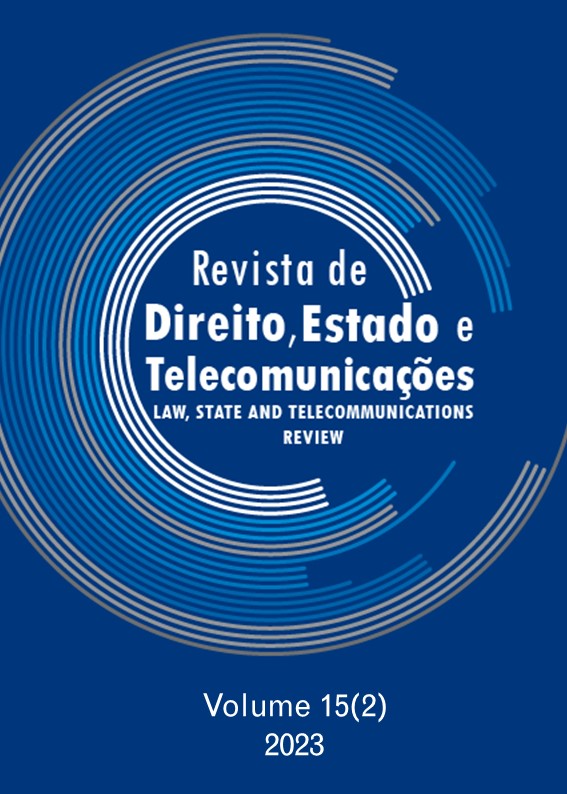The Concept of Artificial Intelligence in Justice
DOI:
https://doi.org/10.26512/lstr.v15i2.44906Keywords:
Legal Proceedings. Artificial Intelligence. Electronic Justice. Corporate Disputes.Abstract
[Purpose] The aim of the article is to cover the main definitions of the concept of artificial intelligence, its origins, characteristics, grounds for application, as well as direct interaction and influence on the implementation of the main tasks of justice through the use and development of artificial intelligence in the judicial procedure.
[Methodology/Approach/Design] To solve the tasks set, the study employed the appropriate methods and materials of scientific research, namely dialectical, historical, statistical, sociological, and other methods of cognition of processes and phenomena, including specialised methods of grammatical consideration and interpretation of legal norms. Furthermore, an entire block of logical methods was used, including classification (upon creating a complete classification and structuring of scientific hypotheses and assumptions), extrapolation, induction and deduction, analogy, abstraction, comparison.
[Findings] This paper investigates the emergence and transformation of artificial intelligence in modern technological and information relations, its gradual introduction in various spheres of life, namely the ways of implementation and the possibility of application in justice. Furthermore, the study analyses possible ways and legal consequences of introducing artificial intelligence into the e-justice system in Ukraine and proposes the stages of reformation.
[Practical Implications] The materials of this study are of practical value in the implementation of the goals set for the active use of artificial intelligence tools and their gradual improvement, including the development of methodological guidelines, legislative acts covering the judicial procedure and reference books and recommendations for the interpretation of regulations that have already been adopted in the process of introducing electronic justice in the country.
Downloads
References
Aletras, N., Tsarapatsanis, D., Preoţiuc-Pietro, D. & Lampos, V. (2018). Predicting judicial decisions of the European Court of Human Rights: A Natural Language Processing Perspective. PeerJ Computer Science, 2, e93.
Application of Artificial Intelligence on the Basis of the Court of First Instance: VRP Initiates the Launch of a Pilot Project. (2021). Available at: https://jurliga.ligazakon.net/news/201578_zastosuvannya-shtuchnogo-ntelektu-na-baz-sudu-persho-nstants-vrp-ntsyu-zapusk-plotnogo-proektu.
Artificial Intelligence: The Next Digital Frontier? (2017). Available at: https://www.mckinsey.com/~/media/mckinsey/industries/advanced%20electronics/our%20insights/how%20artificial%20intelligence%20can%20deliver%20real%20value%20to%20companies/mgi-artificial-intelligence-discussion-paper.ashx
Babak, V. P., Babak, S.V., Eremenko, V.S., Kuts, Y.V., Myslovych M.V., Scherbak, L.M. & Zaporozhets, A.O. (2021). Models of Measuring Signals and Fields. Studies in Systems, Decision and Control, 360, 33-59.
Buocz, T. J. (2018). Artificial intelligence in court: Legitimacy problems of AI assistance in the judiciary. Retskraft — Copenhagen Journal of Legal Studies, 2(1), 41-59.
Cherniavskyi, S. S., Holovkin, B. M., Chornous, Y. M., Bodnar, V. Y. & Zhuk, I. V. (2019). International cooperation in the field of fighting crime: Directions, levels and forms of realization. Journal of Legal, Ethical and Regulatory Issues, 22(3), 1-11.
Council of Europe. (2018). European Ethical Charter on the Use of Artificial Intelligence in Judicial Systems and Their Environment. Available at: https://rm.coe.int/ethical-charter-en-for-publication-4-december-2018/16808f699c.
European Commission. (2020). On Artificial Intelligence – A European approach to excellence and trust. Available at: https://ec.europa.eu/info/sites/default/files/commission-white-paper-artificial-intelligence-feb2020_en.pdf.
Furashev, S. O. (2018). Internet of things: Problems of legal regulation and implementation. Kyiv: Polytechnic Publishing House.
Getman, A., Karasiuk, V., Hetman, Y. & Shynkarov, O. (2019). Ontological representation of legal information and an idea of crowdsourcing for its filling. Advances in Intelligent Systems and Computing, 836, 179-188.
Goldfarb, A. & Trefler, D. (2018). AI and International Trade. Cambridge: National Bureai of Economic Research.
Larina, O. S. & Ovchinsky, V. S. (2020). Artificial intelligence. Ethics and law. Moscow: Knizhnyĭ mir.
Lomakin, N. I. & Samorodova, I. A. (2017). Digital economy with artificial intelligence, 254-257. Advances in Science and Technology: Collection of articles based on the results of the IX International Scientific and Practical Conference. Moscow: Research and Publishing Center “Aktualnost.RF”.
Matveev, M. G., Sviridov, A. S. & Aleinikova, N. A. (2008). Artificial intelligence models and Methods. Application in economics. Moscow: Publishing House “Finansy i Statistika”.
Nesbitt, J. (2017). Ways artificial intelligence is transforming trade. Available at: https://www.tradeready.ca/2017/topics/import-export-trade-management/4-ways-artificial-intelligence-transforming-trade/
Pittman, K. (2016). Infographic: A brief history of collaborative robots. Available at: https://www.engineering.com/story/infographic-a-brief-history-of-collaborative-robots.
Ponkin, I. V. & Redkina, A. I. (2018). Artificial intelligence from the point of view of law. Bulletin of the Peoples' Friendship University of Russia. Series: Legal Sciences, 22(1), 91-109.
Shemshuchenko, V. (2021). Artificial intelligence in justice. Available at: https://cedem.org.ua/analytics/shtuchnyj-intelekt-pravosuddia/.
Shulzhenko, N. & Romashkin, S. (2021). Types of individual criminal responsibility according to article 25 (3) of Rome Statute. Juridical Tribune, 11(1), 72-80.
Tacij, V. J., Tjutjugin, V. I. & Grodeckij, J. V. (2014). Conceptual model establish responsibility for offense in the legislation of Ukraine. Criminology Journal of Baikal National University of Economics and Law, 2014(3), 166-183.
World Bank Group. (2016). Harnessing the Power of Big Data for Trade and Competitiveness Policy. Available at: https://openknowledge.worldbank.org/bitstream/handle/10986/26266/113275-WP-PUBLIC-P152206-8-3-2017-17-28-0-BigDataTCEdited.pdf?sequence=5&isAllowed=y.
Yaroshenko, O. M., Vapnyarchuk, N. M., Burnyagina, Y. М., Kozachok-Trush, N. V. & Mohilevskyi, L. V. (2020). Professional development of employees as the way to innovative country integration. Journal of Advanced Research in Law and Economics, 11(2), 683-695.
ZAKIROV, R.F. (2018). The use of modern IT-technologies as a means to achieve the main objectives of the judiciary. Bulletin of the Civil Process, 2(1), 211-219.
Downloads
Published
How to Cite
Issue
Section
License
Copyright (c) 2023 Law, State and Telecommunications Review

This work is licensed under a Creative Commons Attribution 4.0 International License.
By submitting this paper to the Law, State and Telecommunications Review,
I hereby declare that I agree to the terms of the Creative Commons Attribution 4.0 International (CC BY 4.0).


